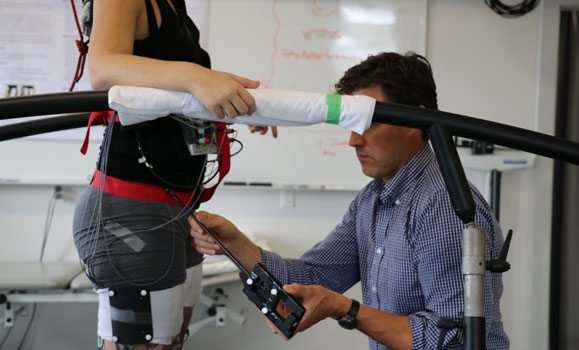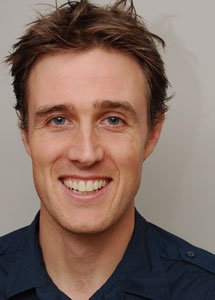News
» Go to news mainResearch Profile ‑ Dr. Derek Rutherford
The Research Profile is an in depth look at research being conducted in the FHP. Each profile highlights the research achievements, goals and interests of a faculty member in their own words.

Name: Derek J Rutherford
Title: Assistant Professor, Physiotherapist
Degrees: BSc Hon, BSc PT, MSc, PhD
FHP School: Physiotherapy
Years employed at Dal: 11 (4 as Assistant Professor)
Research Snapshot
When and how did you decide that health research would be your career?
Working as a physiotherapist, I recognized that I did not have the skills to truly understand the research methodologies and outcomes pertaining to the areas of interest in lower extremity movement mechanics. I found this to be limiting my evolution as a physiotherapist interested in evidence based practice. In addition, I found that much of the research was lagging behind many clinical practice initiatives and trends we would see in the clinic. I graduated from the University of Toronto around the time of the transition from the Bachelors Degree in Physiotherapy to a Masters in Physiotherapy in the early 2000’s. I was also interested in teaching, but with my BSc.PT degree, my options were limited. Together these elements provided the main thrust to enter into my current career.
Looking back
Is there an individual, community/group or incident that has inspired – or continues to inspire – your research?
Looking back, I do not see any individual, group or particular incident that inspired or continues to inspire my research. What continues to inspire me is the multidisciplinary approach to our musculoskeletal research enterprise fostered here at Dalhousie University. From physiotherapists, to engineers, surgeons and kinesiologists, across the Faculties of Health Professions, Medicine and Engineering, our approach to understanding the implications for knee and hip osteoarthritis on joint function and physical activity is unique and challenging. I designed the Joint Action Research Laboratory in the School of Physiotherapy, a state of the art motion analysis research lab with capabilities in human movement assessments not available anywhere else in Atlantic Canada. As far as we know, we are the only group in the world to begin systematically testing how individuals with knee and hip osteoarthritis respond to unexpected systematic perturbations during walking, collaborating with a research group at the VU medical Center in Amsterdam, the Netherlands to continue to move this initiative forward. Grad students training in the JAR Lab are securing external scholarships and we are attracting international interest in our work here in the School of Physiotherapy. What is not inspiring about that!
What's been most unexpected about your career to date?
My Career. If you had asked anyone 20 years ago whether they thought 1) I would have been a physiotherapist or 2) I would be a professor at Dalhousie University leading a world class research lab in Human Movement Science, they would have said “not a chance.”
What made you want to be a part of Dalhousie?
Nova Scotia is a great place to live, bring up my kids and play in the outdoors. Dalhousie University is the only school in Atlantic Canada that offers a Physiotherapy degree and the team in the School of Physiotherapy is world class. We work hard, we play hard and getting to and from work is only a short distance away.

What do you enjoy most about working in the Faculty of Health Professions?
The collaborative nature of the Faculty. While it is dispersed all over campus, I do feel that when we get together, it is always with open reception.
What do you feel has been your greatest success to date? Conversely, what has been your greatest challenge, and what lessons did you take from it?
From an academic stand point, I think my greatest success is a combinations of many small successes ranging from: the design of the Joint Action Research Laboratory, to initiating the only Physiotherapy program option in the country that allows students interested in research and physiotherapy to complete a joint program in the School of Physiotherapy, to being Chair of our Admissions Committee. I think the biggest challenge was the design and development of the Laboratory. I learned that things take time, and there is very little you can do about it.
Looking outward
What advice would you give to a junior colleague or student just starting their career?
Stand up for what you believe in, embrace challenge, the greatness of Dalhousie University was not built in one day, and find balance between personal and professional life.
How has the prevalence of social media and other forms of online communication influenced your research?
It has not really influenced my research directly. What it has provided is a way to reach our students, clinicians and fellow researchers in a non-traditional knowledge translation medium. In turn, this has likely had a positive indirect influence. If anyone wants to know more about the work I do, my website is an easy direction to provide them and its available 24/7.
If you had the opportunity to write one tweet about your research that would be read by all Canadians, what would you share in 140 characters?
Be active: Stay active. Don’t let osteoarthritis keep you from enjoying life and #StrikeOutArthritis. Visit http://bit.ly/1VJQCz9 for tips.
Looking forward
What do you think will change about your research over the next five years?
There will be focus on industry interaction, clinical integration and international collaboration. It is getting more difficult to secure grants for operating costs. In the past five years, there have been many changes in the way research is funded and I expect this will continue to change. Seeking a wider collaborative network while engaging other means conducting research and involving individuals from outside academia will likely be the thrust of the changes in my research over the next five years.
If you could only accomplish one thing in your career, what would it be?
I’m an optimist, but even this is a little far-fetched. I don’t see the future in this manner. Setting yourself for the accomplishment of one thing is a recipe for disaster. If I were to answer truthfully…Seeing my kids, and their kids be successful.
Recent News
- Breaking the cycle: Rethinking substance use, stigma, and social inequities in Canada
- Top 10 Dal Health stories of 2024
- Cards for care: Semester three nursing students collect $1,600 for MOSH
- Master of Health Administration grad continuing cancer research in PhD in Health program
- SWAB‑Rx study aims to expand sexual health services in pharmacies
- Master of Science in Occupational Therapy grad passionate about sustainability in health‑care
- MSc (Rehabilitation Research) grad explores passion for science communication
- The science of winning: Dal Health professor guides Canada’s Olympic athletes to peak mental performance
